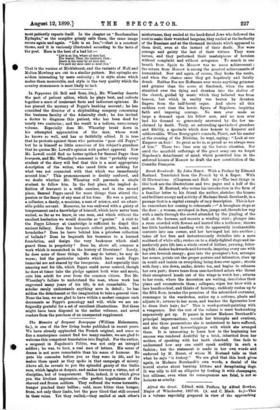The Memoirs of Sergeant Bourgogne (William Heinemann, 6s.), is one
of the few living books published in recent years. We have already applauded the French original, and since so fine a masterpiece cannot find too many readers, we are glad to welcome this competent translation into English. For the author, a sergeant in Napoleon's Mites, was not only an intrepid soldier ; he was, to boot, a real man of letters. His sense of drama is not more remarkable than his sense of humour. He puts his comrades before you as they were in life, and he makes them speak as they spoke in that campaign of misery. Above all, he reveals to you the splendid gaiety of the Gallic race, which laughs at despair, and makes bravery a virtue, not of discipline, but of temperament. This, indeed, it is which gives you the liveliest impression,—the perfect hopefulness of the starved and frozen soldiers. They suffered the worse torments; hunger pinched their bellies ; cold, more bitter than hunger, froze, not only their limbs, but the poor blood that still coursed in their veins. Yet they smiled,—they smiled at each other's misfortunes, they smiled at the hard-fisted Jews who followed the rout to make their wretched bargains, they smiled at the barbarity of the Russians and at the thousand incidents which appeared to them droll, even at the instant of their death. Nor were courage and gaiety the last of their virtues. They were heroes, and they performed their masterpieces of heroism without complaint and without arrogance. To march in one breath from Spain to Moscow was no mean achievement ; the return from Moscow is among the greatest achievements of humankind. Now and again, of course, they broke the ranks, and when the chance came they got hopelessly and fatally drunk. Neither Poe nor Hoffmann ever wrote anything grimmer and grimier than the scene at Smolensk, when the men stumbled over the dying and drunken into the shelter of the church, guided by music which they believed was from heaven, but which in reality was beaten by drunken fingers from the half-burnt organ. And above all this reckless rout rises the heroic figure of Napoleon, inspiring faith and imposing courage. No man ever made so large a demand upon his fellow men, and no man ever had his demand so generously answered by the few un- claimed by death. Truly, an astounding spectacle of grandeur and fidelity, a spectacle which does honour to Emperor and soldiers alike. When Bourgogne's comrade, Picart, saw his master at the crossing of the Berkina, he wept, saying : "Look at our Emperor on foot ! So great as he 1B, so proud as we always were of him." These two lines sum up the heroic situation. Nor amid the manifold sufferings of the great army can we forget Napoleon's detachment of mind, which permitted him in the enforced leisure of Moscow to draft the new constitution of the ComBdie Francaise.


































 Previous page
Previous page